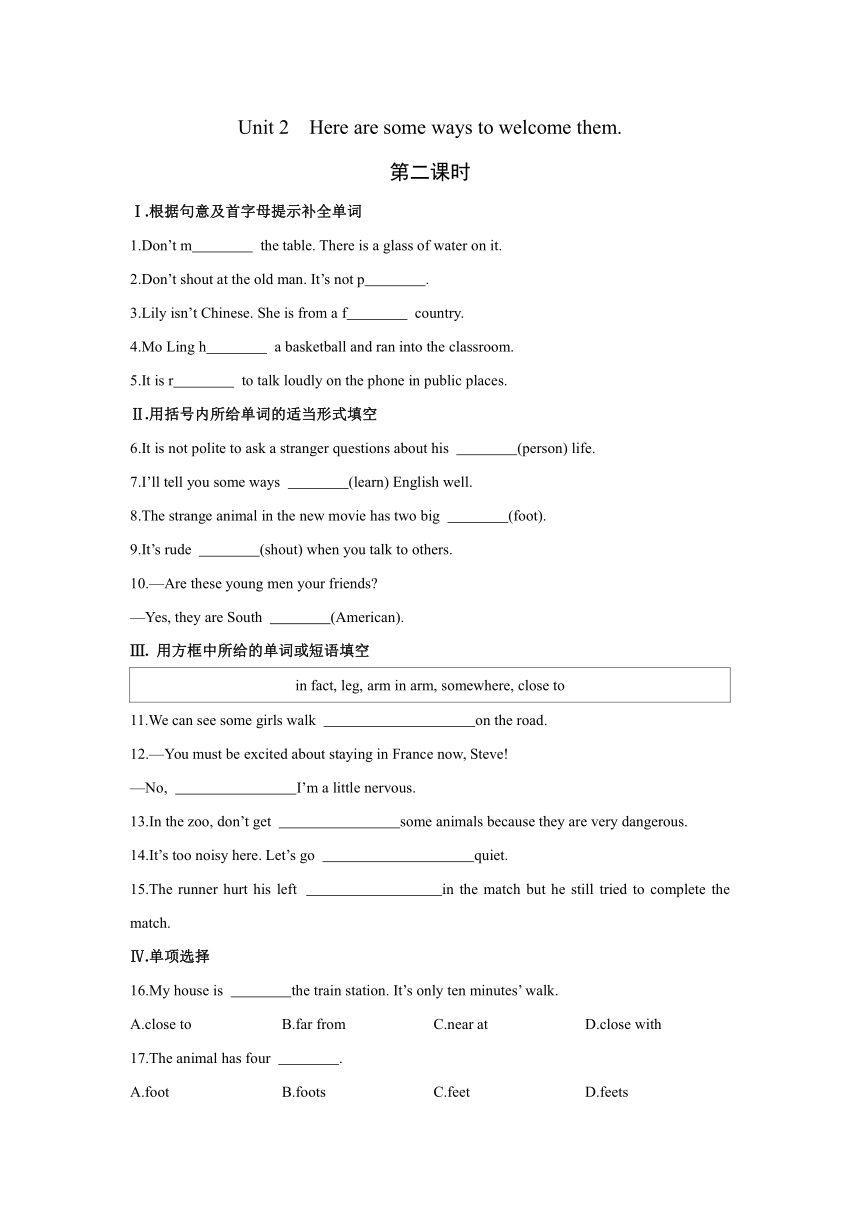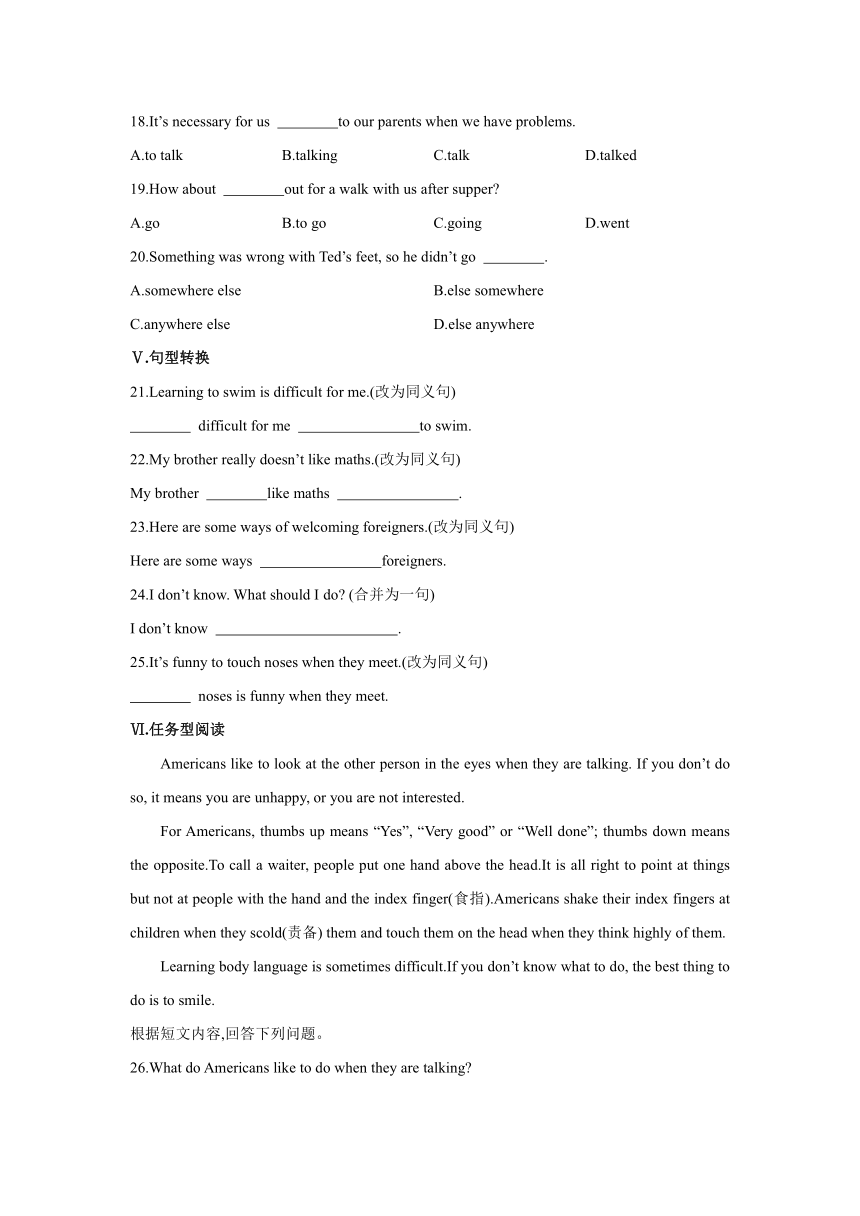外研版英语七年级下册课时练习Module 11 Body language Unit 2 Here are some ways to welcome them.第二课时(含答案)
文档属性
| 名称 | 外研版英语七年级下册课时练习Module 11 Body language Unit 2 Here are some ways to welcome them.第二课时(含答案) |

|
|
| 格式 | docx | ||
| 文件大小 | 45.9KB | ||
| 资源类型 | 教案 | ||
| 版本资源 | 外研版 | ||
| 科目 | 英语 | ||
| 更新时间 | 2022-04-03 00:00:00 | ||
图片预览


文档简介
Unit 2 Here are some ways to welcome them.
第二课时
Ⅰ.根据句意及首字母提示补全单词
1.Don’t m the table. There is a glass of water on it.
2.Don’t shout at the old man. It’s not p .
3.Lily isn’t Chinese. She is from a f country.
4.Mo Ling h a basketball and ran into the classroom.
5.It is r to talk loudly on the phone in public places.
Ⅱ.用括号内所给单词的适当形式填空
6.It is not polite to ask a stranger questions about his (person) life.
7.I’ll tell you some ways (learn) English well.
8.The strange animal in the new movie has two big (foot).
9.It’s rude (shout) when you talk to others.
10.—Are these young men your friends
—Yes, they are South (American).
Ⅲ. 用方框中所给的单词或短语填空
in fact, leg, arm in arm, somewhere, close to
11.We can see some girls walk on the road.
12.—You must be excited about staying in France now, Steve!
—No, I’m a little nervous.
13.In the zoo, don’t get some animals because they are very dangerous.
14.It’s too noisy here. Let’s go quiet.
15.The runner hurt his left in the match but he still tried to complete the match.
Ⅳ.单项选择
16.My house is the train station. It’s only ten minutes’ walk.
A.close to B.far from C.near at D.close with
17.The animal has four .
A.foot B.foots C.feet D.feets
18.It’s necessary for us to our parents when we have problems.
A.to talk B.talking C.talk D.talked
19.How about out for a walk with us after supper
A.go B.to go C.going D.went
20.Something was wrong with Ted’s feet, so he didn’t go .
A.somewhere else B.else somewhere
C.anywhere else D.else anywhere
Ⅴ.句型转换
21.Learning to swim is difficult for me.(改为同义句)
difficult for me to swim.
22.My brother really doesn’t like maths.(改为同义句)
My brother like maths .
23.Here are some ways of welcoming foreigners.(改为同义句)
Here are some ways foreigners.
24.I don’t know. What should I do (合并为一句)
I don’t know .
25.It’s funny to touch noses when they meet.(改为同义句)
noses is funny when they meet.
Ⅵ.任务型阅读
Americans like to look at the other person in the eyes when they are talking. If you don’t do so, it means you are unhappy, or you are not interested.
For Americans, thumbs up means “Yes”, “Very good” or “Well done”; thumbs down means the opposite.To call a waiter, people put one hand above the head.It is all right to point at things but not at people with the hand and the index finger(食指).Americans shake their index fingers at children when they scold(责备) them and touch them on the head when they think highly of them.
Learning body language is sometimes difficult.If you don’t know what to do, the best thing to do is to smile.
根据短文内容,回答下列问题。
26.What do Americans like to do when they are talking
27.What does thumbs down mean in America
28.What do Americans do when they want to praise a child
29.What can you do if you don’t know what to do in a foreign country
30.What’s the main idea of the passage
Ⅶ.根据短文内容及首字母提示完成短文
In America when people meet each other for the first time, they talk 31.a things like weather, family, work, school, or sports. They ask questions like “Do you have any brothers 32.o sisters ”, “Where do you work ”, “What school do you go to ” and “Do you like sports ” They 33.a ask questions like “Where do you come from ” and “Where do you live ” These are polite questions. But some things are 34.p , and questions about them are not 35.p . People don’t ask questions about a person’s salary(薪水). They don’t ask 36.h much someone paid for something. It is OK to ask children how old they are, but it is not polite to ask older people about their 37.a . It is also not polite to ask people questions about religion(宗教) if you don’t know them very 38.w . People don’t ask unmarried people “39.W are you single ” and they don’t ask a married couple with no 40.k “Why don’t you have any children ”
Unit 2 Here are some ways to welcome them.
第二课时
Ⅰ.1.move 2.polite 3.foreign 4.held 5.rude
Ⅱ.6.personal 7.to learn 8.feet 9.to shout 10.Americans
Ⅲ.11.arm in arm 12.in fact 13.close to 14.somewhere 15.leg
Ⅳ.16.A
17.C
18.A
19.C
20.C
Ⅴ.21.It’s; to learn 22.doesn’t; at all
23.to welcome 24.what to do
25.Touching
Ⅵ.26.They like to look at the other person in the eyes.
27.It means “No”, “Very bad” or “Badly done”.
28.They touch him or her on the head.
29.You can just smile.
30.Body language in America.
Ⅶ.31.about 32.or 33.also
34.personal 35.polite 36.how
37.age 38.well 39.Why 40.kid(s)
第二课时
Ⅰ.根据句意及首字母提示补全单词
1.Don’t m the table. There is a glass of water on it.
2.Don’t shout at the old man. It’s not p .
3.Lily isn’t Chinese. She is from a f country.
4.Mo Ling h a basketball and ran into the classroom.
5.It is r to talk loudly on the phone in public places.
Ⅱ.用括号内所给单词的适当形式填空
6.It is not polite to ask a stranger questions about his (person) life.
7.I’ll tell you some ways (learn) English well.
8.The strange animal in the new movie has two big (foot).
9.It’s rude (shout) when you talk to others.
10.—Are these young men your friends
—Yes, they are South (American).
Ⅲ. 用方框中所给的单词或短语填空
in fact, leg, arm in arm, somewhere, close to
11.We can see some girls walk on the road.
12.—You must be excited about staying in France now, Steve!
—No, I’m a little nervous.
13.In the zoo, don’t get some animals because they are very dangerous.
14.It’s too noisy here. Let’s go quiet.
15.The runner hurt his left in the match but he still tried to complete the match.
Ⅳ.单项选择
16.My house is the train station. It’s only ten minutes’ walk.
A.close to B.far from C.near at D.close with
17.The animal has four .
A.foot B.foots C.feet D.feets
18.It’s necessary for us to our parents when we have problems.
A.to talk B.talking C.talk D.talked
19.How about out for a walk with us after supper
A.go B.to go C.going D.went
20.Something was wrong with Ted’s feet, so he didn’t go .
A.somewhere else B.else somewhere
C.anywhere else D.else anywhere
Ⅴ.句型转换
21.Learning to swim is difficult for me.(改为同义句)
difficult for me to swim.
22.My brother really doesn’t like maths.(改为同义句)
My brother like maths .
23.Here are some ways of welcoming foreigners.(改为同义句)
Here are some ways foreigners.
24.I don’t know. What should I do (合并为一句)
I don’t know .
25.It’s funny to touch noses when they meet.(改为同义句)
noses is funny when they meet.
Ⅵ.任务型阅读
Americans like to look at the other person in the eyes when they are talking. If you don’t do so, it means you are unhappy, or you are not interested.
For Americans, thumbs up means “Yes”, “Very good” or “Well done”; thumbs down means the opposite.To call a waiter, people put one hand above the head.It is all right to point at things but not at people with the hand and the index finger(食指).Americans shake their index fingers at children when they scold(责备) them and touch them on the head when they think highly of them.
Learning body language is sometimes difficult.If you don’t know what to do, the best thing to do is to smile.
根据短文内容,回答下列问题。
26.What do Americans like to do when they are talking
27.What does thumbs down mean in America
28.What do Americans do when they want to praise a child
29.What can you do if you don’t know what to do in a foreign country
30.What’s the main idea of the passage
Ⅶ.根据短文内容及首字母提示完成短文
In America when people meet each other for the first time, they talk 31.a things like weather, family, work, school, or sports. They ask questions like “Do you have any brothers 32.o sisters ”, “Where do you work ”, “What school do you go to ” and “Do you like sports ” They 33.a ask questions like “Where do you come from ” and “Where do you live ” These are polite questions. But some things are 34.p , and questions about them are not 35.p . People don’t ask questions about a person’s salary(薪水). They don’t ask 36.h much someone paid for something. It is OK to ask children how old they are, but it is not polite to ask older people about their 37.a . It is also not polite to ask people questions about religion(宗教) if you don’t know them very 38.w . People don’t ask unmarried people “39.W are you single ” and they don’t ask a married couple with no 40.k “Why don’t you have any children ”
Unit 2 Here are some ways to welcome them.
第二课时
Ⅰ.1.move 2.polite 3.foreign 4.held 5.rude
Ⅱ.6.personal 7.to learn 8.feet 9.to shout 10.Americans
Ⅲ.11.arm in arm 12.in fact 13.close to 14.somewhere 15.leg
Ⅳ.16.A
17.C
18.A
19.C
20.C
Ⅴ.21.It’s; to learn 22.doesn’t; at all
23.to welcome 24.what to do
25.Touching
Ⅵ.26.They like to look at the other person in the eyes.
27.It means “No”, “Very bad” or “Badly done”.
28.They touch him or her on the head.
29.You can just smile.
30.Body language in America.
Ⅶ.31.about 32.or 33.also
34.personal 35.polite 36.how
37.age 38.well 39.Why 40.kid(s)
同课章节目录
- Module 1 Lost and found
- Unit 1 Whose bag is this?
- Unit 2 Are they yours?
- Unit 3 Language in use
- Module 2 What can you do ?
- Unit 1 I can play the piano
- Unit 2 I can run really fast
- Unit 3 Language in use
- Module 3 Making plans
- Unit 1 What are you going to do at the weekends?
- Unit 2 We're going to cheer the players.
- Unit 3 Language in use
- Module 4 Life in the future
- Unit 1 Everyone will study at home
- Unit 2 Every family will have a small plane.
- Unit 3 Language in use
- Module 5 Shopping
- Unit 1 What can I do for you?
- Unit 2 You can buy everything on the Internet
- Unit 3 Language in use
- Module 6 Around town
- Unit 1 Could you tell me how to get to the Nationa
- Unit 2 The London Eye is on your right.
- Unit 3 Language in use
- Revision module A
- Module 7 My past life
- Unit 1 I was born in a small village.
- Unit 2 I was born in Quincy.
- Unit 3 Language in use
- Module 8 Story time
- Unit 1 Once upon a time….
- Unit 2 Goldilocks hurried out of the house.
- Unit 3 Language in use
- Module 9 Life history
- Unit 1 He left school and began work at the age of
- Unit 2 He decided to be an actor.
- Unit 3 Language in use
- Module 10 A holiday journey
- Unit 1 What did you do?
- Unit 2 This morning we took a walk.
- Unit 3 Language in use
- Module 11 Body language
- Unit 1 They touch noses!
- Unit 2 Here are some ways to welcome them.
- Unit 3 Language in use
- Module 12 Western music
- Unit 1 It's so beautiful!
- Unit 2 Vienna is the centre of European classical
- Unit 3 Language in use
- Revision module B
